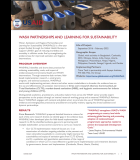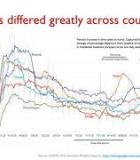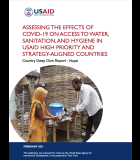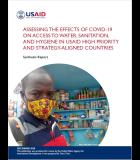Nepal Health and Hygiene Activity–Swachchhata
The USAID-funded, five-year (2016 – 2021) Health and Hygiene Activity, named as Swachchhata, aims to contribute to Nepal’s 2014–2018 Country Development Cooperation Strategy (CDCS) goal of a healthier and well-nourished population. The project is implemented by SNV and its partner, Population Services International (PSI), with an overarching purpose of improving community health status through improved integration of hygiene and health services. The project uses an integrated approach with a dual focus on improving quality of health and hygiene service delivery in the Mid-Western Development Region (MWDR), more specifically the two mountain districts of Kalikot and Dolpa and the three hill districts, Jajarkot, Rukum, and Salyan.
Activity Description
In addition to the infrastructural investments in these HFs, the project will work extensively with stakeholders at the village, community, district, and national level to strengthen community ownership, activate stronger governance structures, and establish a solid base for project sustainability. Swachchhata will provide a series of intensive trainings that target medical and management staff at the HFs along with members of various community based committees. These trainings will cover a range of topics including proper facility maintenance procedures, sanitation systems development, proper hygiene and infection prevention at the facilities, and the development of best practices for effective and consistent engagement in Behavior Change Communication (BCC).
Expected Outcomes
The expected outcomes are that:
- At least 80 health care facilities (HFs) will have new or improved small scale, safe water treatment and maintenance systems and functional sanitation systems that are sensitive to people with special needs (such as pregnant women and people with disabilities).
- At least 60 HFs will have new or renovated solar power supplies with affordable maintenance systems in place.






